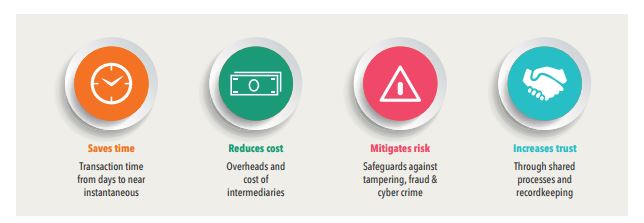Nearly 80% of insurance executives have either already adopted or planning to pilot blockchain technology across their business units. The level of trust, transparency, and immutability that blockchain (distributed ledger technology) provides is impeccable.

Blockchain offers an independently verifiable dataset so that insurers, as well as customers, need not suffer from decisions based on inappropriate/incomplete information. In the instances of travel insurance, blockchain-based systems use external data sources to validate whether a flight was missed or canceled. Accordingly, insurers can decide on processing refund claims. Well, blockchain can handle even more complex situations of road accidents by accurately determining the vehicle or human fault.
The 5 practical blockchain use-cases in the insurance industry are-
- Fraud detection
- IoT & Blockchain together to structure data
- Multiple risk participation/Reinsurance
- On-demand insurance
- Microinsurance
Fraud Detection
In the US alone, every year fraudulent claims account for more than $40 billion, which is excluding health insurance. Despite digitization, the standard methods fail to recognize fraud. Blockchain can help in fraud detection and prevention to a great extent.
Blockchain ensures that all the executed transactions are permanent and timestamped. I.e. no one, including insurers, can modify the data preventing any kind of breaches. This data can further help in defining patterns of fraudulent transactions, which insurers can use in their fraud prevention algorithms.
Fraud detection using blockchain use case: Etherisc
Powered by smart contracts, Etherisc independently verifies claims by using multiple data sources. For example, for crop insurance claims, it compares satellite images, weather reports, and drone images with the image provided by the claimant.
IoT & Blockchain together to structure data
As IoT will connect more and more devices, the amount of data generated from each of the devices will increase significantly. For instance, there were 26.66 billion active IoT devices in 2019 and nearly 127 IoT devices connect to the internet every second.
This data is extremely valuable for insurers to develop accurate actuarial models and usage-based insurance models. Considering the auto insurance sector, the data collected about driving time, distances, acceleration, breaking patterns, and other behavioral statistics can identify high-risk drivers.
But, the question is — how to manage the enormous data as millions of devices are communicating every second.
And the answer is a blockchain!
It allows users (insurers) to manage large and complex networks on a peer-to-peer basis. Instead of building expensive data centers, blockchain offers a decentralized platform to store and process data.
Multiple risk participation/Reinsurance
Reinsurance is insurance for insurers. It protects the insurers when large volumes of claims come in.
Also read – 5 biggest insurance claims payouts in history
Because of information silos and lengthy processes, the current reinsurance system is highly inefficient. Blockchain can bring twofold advantages to reinsurers. One — unbreached records for accurate claims analysis and two — speeding-up the process through automated data/information sharing. PwC estimates that blockchain can help the reinsurance industry save up to $10 billion by improving operational efficiency.
For example, in 2017, B3i (a consortium for exploring blockchain in insurance) launched a smart contract management system for Property Cat XOL contracts. It is a type of reinsurance for catastrophe insurance.
On-demand insurance
On-demand insurance is a flexible insurance model, where policyholders can turn on and off their insurance policies in just a click. More the interactions with policy documents, the greater the hassle to manage the records.
For instance, on-demand insurance requires underwriting, policy documents, buyers records, costing, risk, claims, and so on much more than traditional insurance policies.
But, thanks to blockchain technology, maintaining ledgers (records) has become simpler. On-demand insurance players can leverage blockchain for efficient record-keeping from the inception of the policy until its disposal. An interesting blockchain insurance use cases is that of Ryskex — a German InsurTech, founded in 2018. It provides blockchain-powered insurance platform to B2B insurers to transfer risks faster and more transparently.
Microinsurance
Instead of an all-encompassing insurance policy, microinsurance offers security against specific perils for regular premium payments, which are far less than regular insurances. Microinsurance policies deliver profits only when distributed in huge volumes. However, because of low profit-margin and high distribution cost, despite immediate benefits, microinsurance policies don’t get the deserved traction.
Blockchain can offer a parametric insurance platform. With this, insurers will need fewer local agents and “oracles” can replace adjusters on the ground. For example, Surity.ai uses blockchain to offer microinsurance to the Asian populace, especially those not having access to the services of banks or other financial organizations.
For further queries around blockchain / insurance use cases, please feel free to drop us a word at hello@mantralabsglobal.com.
Related blockchain articles –
Knowledge thats worth delivered in your inbox





